Why can’t a baby bird just hatch out of the egg and fly away, or at least, be able to fly a little and not require weeks of constant feeding and attention? I suspect they CAN do this but just refuse to in order to steal parental investment, which is, after all, a very valuable resources. Baby turtles and crocodiles are born as miniature versions of adults. Some birds do this a little. Baby ducks and chickens s are the mensches of the bird world; they don’t spend all that time sitting there uselessly and constantly demanding attention. Sure, turtles and crocs are tiny and vulnerable and most of them get eaten by monitor lizards, seagulls, big fish, or other predators. But baby birds get eaten by predators too (often other birds), so I’m not impressed with the difference.

Baby birds are different from baby mammals in some interesting ways. Baby birds garner food by signaling the adults using noises and by assailing them with views of the enormous gaping baby bird mouth. That is a signal that always says “I’m hungry feed me NAO!” but that may also say “I’m probably your offspring and not some cuckolding species’ offspring. Maybe!!!”
We know that the baby bird signaling and the parent response, as well as some signaling form the parent, have co-evolved. You are probably familiar with the famous experiments in which a baby seagull could easily be made to pay more attention to a fake parent seagull beak, ignoring the actual seagull beak, if the red spot normally found on the seagull beak was exaggerated in size and attached to, say, a pencil.
From The Birder’s Handbook:
The feeding instinct in parental birds is very strong, and feeding behavior is usually elicited by feeding calls and gaping on the part of the chicks. When a bird’s own brood is destroyed, it may transfer its attention to the young of others; observations of birds feeding the young of other parents of the same species, and even of other species, are quite common. One Northern Cardinal was even observed to have adopted a school of gaping goldfish at a pond where the fish were accustomed to begging from people!
This link between baby and adult signaling and response is so strong that adult birds can hardly stop themselves from feeding the babies. This is different from mammals. In mammal species where there is an overproduction of offspring, it is not uncommon for one of the offspring to be underfed so it dies. In some species things can be even more insidious; when hyena babies are born, they dig little miniature burrows off the parent’s burrow, sequester themselves in there, and kill each other. Although it is not at all uncommon for a single baby to end up ejected from the nest one way or another, the more common pattern may be that the adult birds more or less feed all the baby birds about the same amount in response to their gaping mouth signal. This means that if you go around to a bunch of bird nests and add an egg or two to each one, most of the baby birds will suffer because the adults now distribute the food evenly, and thus each baby gets an insufficient amount.
That is an oversimplification of what happens. There is great variation among species of birds, and most of what I just said applies to song birds and others that have three or four babies at once. In any event, the altriciality (utter helplessness) of baby birds combined with this strong signaling behavior results in a pattern that is unique to birds. And we all know birds are unique. All 10,000 species of them.
•••
 Baby Bird Week is our celebration of the young, the cute, the adorable, the twee. We certainly spend enough time on adult birds here on 10,000 Birds so we figured it would only make sense to fawn over the fuzzy bundles of fluff that grow up to become the objects of our fascination. Whether you seek out waterfowl, songbirds, or seabirds we will have baby birds to match your obsession.
Baby Bird Week is our celebration of the young, the cute, the adorable, the twee. We certainly spend enough time on adult birds here on 10,000 Birds so we figured it would only make sense to fawn over the fuzzy bundles of fluff that grow up to become the objects of our fascination. Whether you seek out waterfowl, songbirds, or seabirds we will have baby birds to match your obsession.
Baby Bird Week will run from 15-21 July, Sunday until Saturday. Make sure to check back every day or even multiple times a day to keep up with all the baby bird goodness!
•••
__________
Photo by Linda Cronin

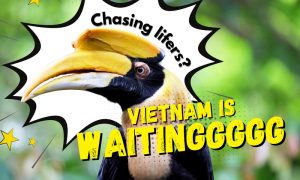


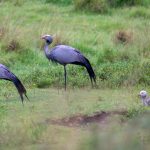
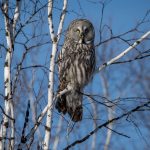


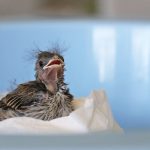
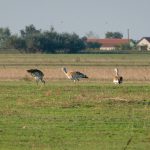

A very interesting post Greg! Gaping goldfish? Now that’s a strong mothering instinct! I had no idea about the Hyena being so Darwinian either. Ruthless.
I’ve long thought that birds are altricial because of the physical constraints of flight. That is, for each kind of bird, its ability to fly depends on highly specialized adaptations that are critically dependent on its adult size and shape. A gull can’t fly like a robin or a sparrow, because they each have flight specializations specific to their size and shape. Similarly, a scaled-down version of a gull probably can’t fly at all, because the physical forces of flight that allow adult gulls to fly don’t scale with body size. Because these physical forces prevent juvenile birds from flying until they reach a near-adult size, natural selection favours behaviours that let them grow to adult size as quickly as possible.
The same reasoning may apply to flying insects (holometabolous or hemimetabolous), which don’t fly until they reach adult size
awww, and I thought my baby chickens followed me because they love me 🙂
Rosie, I know, the demands of flight is in fact the party line and it may well be true. But there is a great deal of variation in developmental patterns of birds, sy almost by definition most chicks are probably being lazy. As it were.